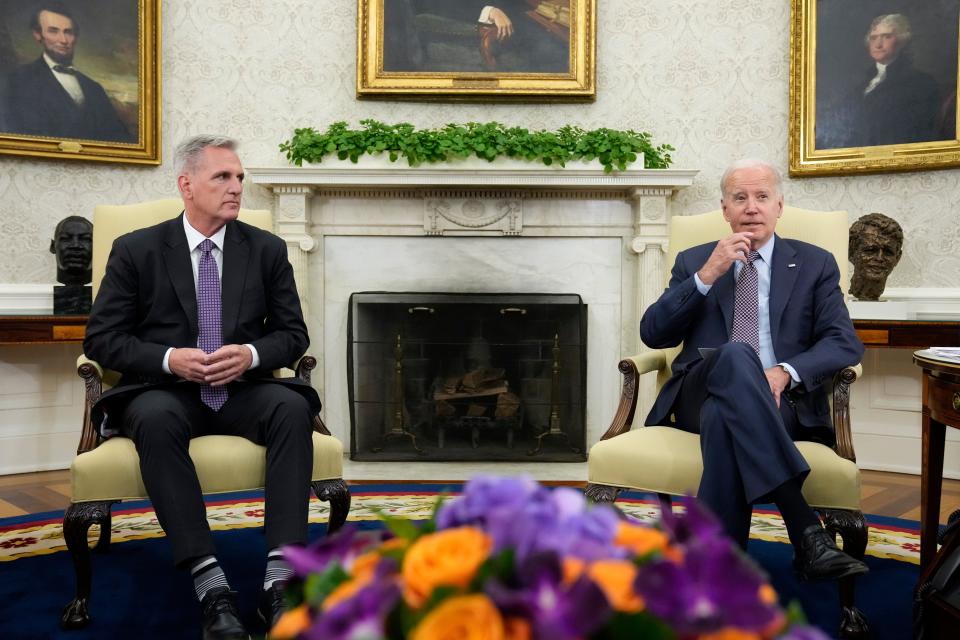Democrats should remember 1972 as they tackle inflation, immigration and debt | Opinion
- Oops!Something went wrong.Please try again later.
- Oops!Something went wrong.Please try again later.
- Oops!Something went wrong.Please try again later.
Fifty-one years ago, the national Democratic Party and its presidential nominee were characterized as the party of ”acid, amnesty and abortion” in one of the more devastating, effective and enduring slogans in American political history.
Its goal was the portrayal of a party in thrall to a far-left fringe element whose policies and philosophy were well out of the American mainstream and should be rejected.
"Acid" referred to the casual acceptance of a drug culture exemplified by the use of the hallucinogenic LSD, known as acid. "Amnesty" referred to forgoing criminal prosecutions and allowing the return to the United States of young men who had moved to Canada to evade the military draft and potential service in the war in Vietnam. "Abortion" referred to legalizing the procedure on demand and without restriction.
President Richard Nixon won reelection, carrying 49 states — losing only Massachusetts to Democratic North Dakota Sen. George McGovern — a 23% victory margin, 18 million more popular votes and 520 votes in the Electoral College. Less than two years later, he resigned the office to avoid impeachment and possible criminal charges over his involvement in the Watergate scandal.
As preparations ramp up for President Joe Biden’s reelection campaign, he confronts his own version of acid, amnesty and abortion — inflation, immigration and in debt.
While lacking quite the same alliterative rhythm of the 1972 catchphrase, it could inflict a similar bite on the Biden administration if economic conditions worsen, tens of thousands of migrants continue streaming across the southern border and the nation teeters on defaulting on its debts for the first time in history.
More perspective from Carl Golden: DeSantis' feud with Disney is self-defeating. Here's why | Opinion
The president enters his reelection phase with public approval under 40% and a decisive majority expressing dissatisfaction with his handling of the economy and immigration.

Coupling that with serious concerns about his age and cognition and his ability to withstand the meat grinder that presidential campaigns have become, a majority of Democrats have expressed a preference for someone else to lead their party into the 2024 election.
While inflation has eased slightly, the cost of living remains high and fears of recession have increased along with rising mortgage rates and dramatically higher costs for everything from cars to eggs.
The Federal Reserve has raised interest rates at 10 consecutive meetings, ratcheting up the pressure on consumers and eroding their purchasing power.
Americans have turned increasingly to credit cards to carry them through, while the number of those who describe their situation as living paycheck to paycheck has risen. High-profile bank failures have contributed to the unease in the country and a fear of what lies ahead.
The record influx of migrants has fractured Democrats as communities along the southern border deal with an unprecedented demand for social services and accommodations beyond their abilities to support.
Democrats in Congress have become increasingly outspoken in their criticisms of the administration's response, while big-city mayors have bused migrants out of their towns and into surrounding communities, citing their own shelters as at capacity and earning the enmity of their neighbors.
The administration response has been one of blaming Congress, minimizing the situation and denying it exists while claiming the border is secure — despite overwhelming visual evidence and widely viewed scenes of mass crowding at border crossings.
Homeland Security Secretary Alejandro Mayorkas has been on the defensive for months, struggling — largely unsuccessfully — to convince Congress that border security is adequate and migrants are treated humanely.
His narrative, though, has been undercut repeatedly by reports and photos of migrants living in tent cities, sleeping in public buildings or outdoors while local governments plead for federal aid to offset the hundreds of millions of dollars spent on housing and caring for migrants.
Meanwhile, the stalemate continues over increasing the national debt limit, with the president adamant in his demand for an unconditional increase while congressional Republicans have agreed to raising the limit in return for trillions in spending cuts.
The administration has warned that the government would default on its obligations as soon as the first week of June, upending the global economy and driving the country into fiscal collapse, including massive job loss and an inability to pay its obligations.
He’s been under pressure to move from his demand for a no-strings-attached debt limit increase and accept certain of the Republican proposals for cutting spending. At the same time, the progressives in his party have called for him to invoke the 14th Amendment to the Constitution, avoid congressional approval and unilaterally extend the debt limit.
Giving in to demands for even modest spending cuts will produce howls of outrage and accusations of betrayal from Democrats, but becoming the first president in American history to preside over debt default would be devastating and provide Republicans with a powerful campaign message of presidential incompetence.
There remains hope that cooler heads will prevail and a compromise will be reached, but Biden will share much of the blame for whatever the outcome and for his perilous brinksmanship with the nation’s economic health.
In 1972, McGovern led far-left wing liberalism. With the positioning of today’s Democratic Party, he’d be considered a moderate.
The acid, amnesty and abortion critique was wildly successful in its time and has stood the test of political effectiveness by being cited a half-century later.
It fit neatly on a bumper sticker or handheld campaign rally sign. Inflation, immigration and in debt may take up a bit more space, but the message is equally succinct.
Carl Golden is a senior contributing analyst with the William J. Hughes Center for Public Policy at Stockton University.
This article originally appeared on NorthJersey.com: Joe Biden inflation, immigration and debt

